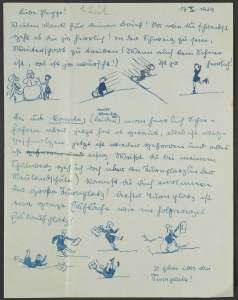Special Collections & Archives is excited to be working with FSU’s Institute on World War II and the Human Experience on an extensive digitization project to bring a large set of letters into DigiNole: FSU’s Digital Repository. As we add new items to the digital library from this collection, the two students in charge of the project will share information about the work and collection on the blog so here is the first post about the new collection!
The Hasterlik-Hine collection housed at the Institute on World War II and the Human Experience at Florida State University is a unique letter collection in terms of its depth and scope. Donated by Giulia Hine (maiden name: Hasterlik) in 2003, this collection has roughly 14,000 German and English letters spanning familiar generations from the 18th to the 21st century. In preparation for the Letters in Troubled Times: Evaluating Epistolary Sources conference set for February 16, 2018, in Tallahassee, Florida, the Institute processed a portion of the collection focusing on letters to and from Giulia in the years 1938 to 1943 and 1945 to 1948.

Giulia Hine was born into a middle-upper class family in Vienna, Austria on September 30, 1925. Her father, Julius Kortischoner passed away in 1928. Before the outbreak of World War II, Mia Hasterlik-Kortischoner, Giulia’s mother, arranged for Giulia and her older half-sister, Suzanne “Susi” Wolff, to emigrate out of Vienna, Austria to escape persecution under the Nuremberg Laws which deemed the family Jewish. At 13 years old Giulia was safely housed in Switzerland where she lived with Frau Alice Sigerist and her daughter Gretli from the end of 1938 to 1946. Susi sailed to Kenya to meet and marry Robert Seemann in an arranged agreement to keep her safe. Mia stayed in Vienna, Austria for a time in order to take care of her elderly father, Paul, who decided he did not want to leave. Eventually, though, Mia left for England and then emigrated to the United States where her sister Auguste was living in New York, New York. As the family scattered all over the world they wrote hundreds of letters to and from her one another and countless friends back home.
Within the letters, one begins to see the intricacies of maintaining long-distance relationships during one of the most dangerous times in modern history. The use of self-censorship in order to avoid creating worry is apparent in letters written by all. For example, while in Switzerland Giulia contracted Poliomyelitis and yet she kept the entire ordeal from her mother until the end of the war. Susi, on a similar note, hid the details of the abuse she suffered while married to Robert. Despite the troubled times and personal struggles, the letters also reveal many small delights encountered by family members and friends such as anecdotes about pets and school trips. One gains an understanding and appreciations for the bonds of family while reading each letter, especially the heartfelt correspondence between Giulia and her grandfather, Paul. These letters serve as a testament to the strength and ingenuity of a family determined to survive and thrive.
The first set of five sets being digitized are now available in DigiNole: FSU’s digital repository. Translations of the letters are forthcoming for this first batch and will be included in each subsequent batch for the project. Stay tuned for new items in the collection over the next few months.
One thought on “A New Digital Collection from the Institute on World War II and the Human Experience”